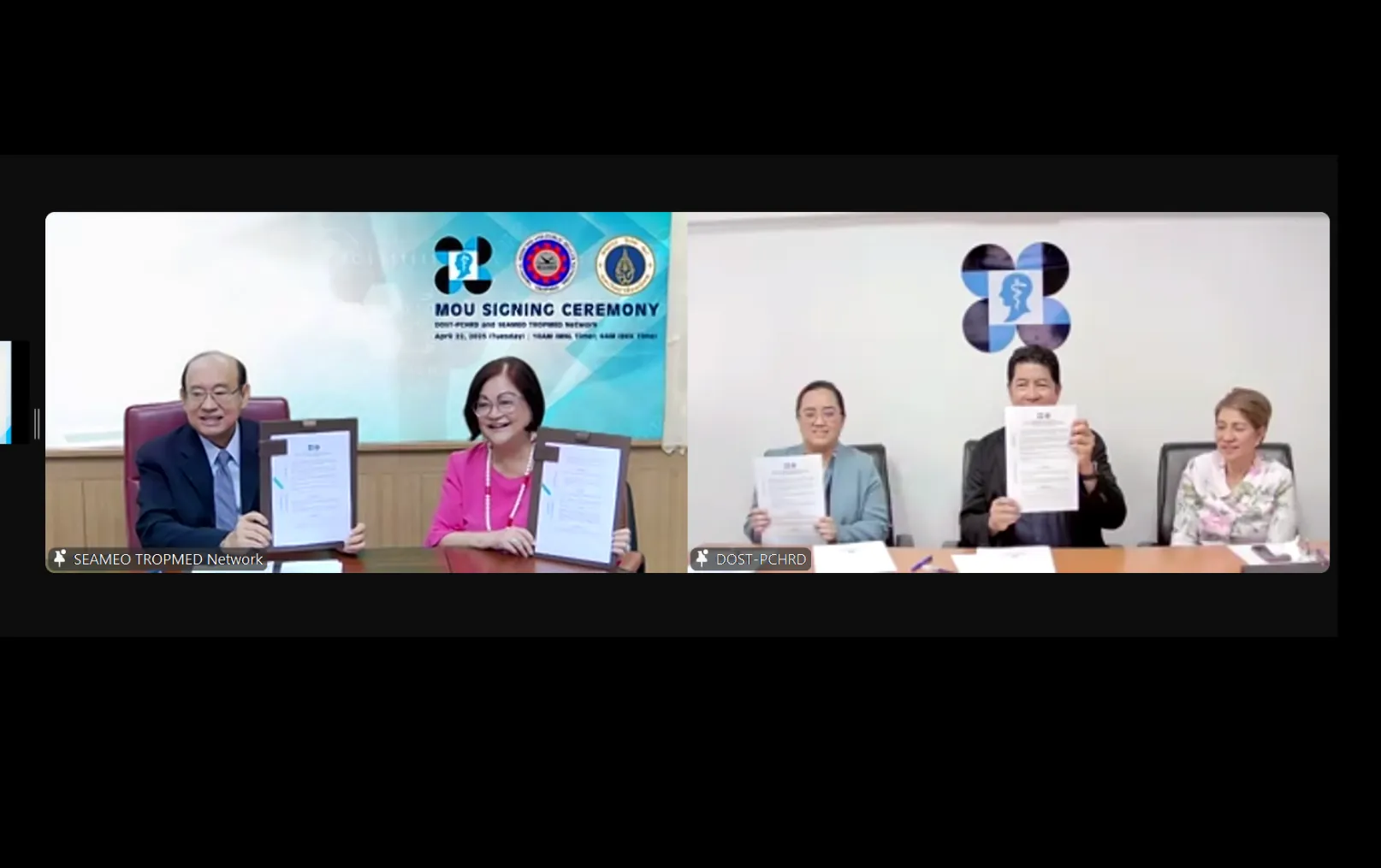NEWS AND UPDATES
DOST’s latest partnership with SEAMEO TROPMED Network to open capacity-building opportunities for Filipinos across Southeast Asia

The Department of Science and Technology – Philippine Council for Health Research and Development (PCHRD) signed a Memorandum of Understanding (MOU) with the Southeast Asian Ministers of Education Tropical Medicine and Public Health (SEAMEO TROPMED) Network last 22 April 2025, to expand the coverage of scholarship opportunities in health for Filipinos across Southeast Asia.
Conducted via Zoom, the MOU virtual signing was attended by officials from both parties, including DOST Undersecretary for Research and Development Dr. Leah Buendia, PCHRD Executive Director Dr. Jaime Montoya, and SEAMEO TROPMED Network Secretary General Dr. Pratap Singhasivanon, and Deputy Coordinator Dr. Ma. Sandra B. Tempongko.
The collaboration serves as an expansion to the preceding partnership forged between the DOST-PCHRD and the SEAMEO TROPMED Thailand in 2021, which aims to develop and implement graduate studies under the Faculty of Tropical Medicine (FTM) in Mahidol University. This initiative with Thailand paved the way for the implementation of MSc and PhD in Tropical Medicine Programs, which supported a total of seven (7) scholars to date.
With the expanded coverage of the partnership, aspiring Filipino scholars may gain access to a wider range of research centers, specialists, and policymakers, offering a multi-country, multi-disciplinary approach for capacity building not only in Thailand, but also in other member countries of the Network within the Southeast Asian region.
Specifically, the collaboration will focus on enhancing capacity-building initiatives, improving diagnostic and treatment approaches, and providing access to globally recognized practices in disease control for improved healthcare delivery. It will also foster coordinated regional initiatives dedicated to addressing the increasing transnational burden of Neglected Tropical Diseases (NTDs).
DOST Secretary Renato U. Solidum Jr. explained how forging partnerships is a key element to the DOST’s strategy in promoting scientific and technological advancement in the Philippines. “The DOST actively pursues collaborative ventures with international partners to expand the reach of our support and programs. We are likewise grateful to the SEAMEO TROPMED Network for this chance to learn, innovate, and develop solutions to health problems that concern our region.”
Affirming the DOST’s commitment to expanding knowledge, supporting education, and building more prepared healthcare systems, Usec. Buendia described the partnership as a way to address diseases that are critical for the Philippines and the region: “Through mutual support and joint efforts, we are better positioned to deal with risks affecting many countries, from dengue and malaria to newer re-emerging and emerging tropical diseases.”
Citing accomplishments from the previous batch of scholars, Dr. Singhasivanon expressed his hope for more aspiring Filipino researchers to engage in the program. He also highlighted how the TROPMED centers can better collaborate under the expanded MOU “for knowledge sharing between scientists in health research and related issues of regional concern.”
Dr. Montoya highlighted how the partnership acknowledges the crucial role of strengthening human capital in setting the direction of the strength and sustainability of healthcare systems. “A key part of our partnership with SEAMEO-TROPMED will provide more opportunities for Filipino students, researchers, and public health professionals to gain advanced education and training in tropical disease epidemiology, emerging infections related to environmental change, diagnostics, and public health and tropical medicine,” he said. “Research partnerships will (also) support studies that reflect real conditions on the ground, generating knowledge that is timely and responsive to current needs,” he added.
Focusing on higher education and research in tropical medicine and public health, the SEAMEO TROPMED network operates in multiple countries within the SEA region, with centers located in the Philippines, Thailand, and Malaysia.
The collaboration will run for five years.




